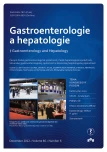-
Medical journals
- Career
Epidemiology of Helicobacter pylori infection in the Slovak Republic
Authors: L. Kužela; M. Oltman; J. Šutka; B. Zacharová; M. Nagy
Authors‘ workplace: Gastro-Hepatologické centrum Thalion, Bratislava
Published in: Gastroent Hepatol 2012; 66(6): 433-437
Category: Clinical and Experimental Gastroenterology: Original Article
Overview
The prevalence of Helicobacter pylori differs significantly both between regions and within single regions. Infection generally shows an indirect correlation with socioeconomic conditions. The aim of our study was to determine the prevalence of H. pylori infection in the section of the Slovakian population over 18 years of age with the aid of the 13C-urea breath test (UBT) and assess the relationship and differences between the incidence of H. pylori and data gathered with the aid of the questionnaire method.
Materials and methods:
Participants were selected randomly according to their place of work. Regular allocation according to individual regions was not a precondition. H. pylori was examined with the aid of UBT. Data on the state of health of participants and their social characteristics was gathered with the aid of the questionnaire method.Results:
The epidemiological survey was realized on a sample of 1,838 respondents (39% male, 61% female). 6% of respondents had attained primary education, 41% secondary education and 53% tertiary education. 645 respondents (35%) were UBT positive. The most frequently stated difficulties were meteorisms, nausea and pyrosis (26, 20, 18%). When comparing data gained from questionnaires, we found statistically significant results only in the observed growth, increasing with age, of H. pylori infection. All other results of the study were insignificant when compared to other data gathered.Conclusion:
The overall current prevalence of H. pylori in the Slovak Republic is 35%.Key words:
Helicobacter pylori infection – epidemiology – breath test – Slovakia
The authors declare they have no potential conflicts of interest concerning drugs, products, or services used in the study.
The Editorial Board declares that the manuscript met the ICMJE „uniform requirements“ for biomedical papers.Submitted:
29. 9. 2011Accepted:
5. 12. 2011
Sources
1. Ertem D, Harmanci H, Pehlivanoglu E. Helicobacter pylori infection in Turkish preschool and school children. Role of socio-economic factors and breast feeding. Turk J Pediatr 2003; 45(2): 114–122.
2. Graham DY, Malaty HM, Evans DG et al. Epidemiology of Helicobacter pylori in an asymptomatic population in the United States. Effect of age, race, and socioeconomic status. Gastroenterology 1991; 100(6): 1495–1501.
3. Malaty HM. Epidemiology of Helicobacter pylori infection. Best Pract Res Clin Gastroenterol 2007; 21(2): 205–214.
4. Suerbaum S, Michetti P. Helicobacter pylori infection. N Eng J Med 2002; 347(15): 1175–1186.
5. Perez-Perez GI, Rothenbacher D, Brenner H. Epidemiology of Helicobacter pylori infection. Helicobacter 2004; 9 (Suppl 1) 1–6.
6. Sörberg M, Nyrén O, Granström M. Unexpected decrease with age of Helicobacter pylori seroprevalence among Swedish blood donors. J Clin Microbiol 2003; 41(9): 4038–4042.
7. Porsch-Örzcumerez M, Doppl W, Hardt PD et al. Impact of migration on Helicobacter pylori seroprevalence in offspring of Turkish immigrants in Germany. Turk J Pediatr 2003; 45(3): 203–208.
8. Megraud F. Helicobacter pylori and antibiotic resistance. Gut 2007; 56(11): 1502.
9. Vakil N, Megraud F. Eradication therapy of Helicobacter pylori. Gastroenterology 2007; 133(3): 985–1001.
10. Das JC, Paul N. Epidemiology and pathophysiology of Helicobacter pylori in children. Indian J Pediatr 2007; 74(3): 287–290.
11. Ernst PB, Gold B. The disease spectrum of H. pylori: the immunopathogenesis of gastroduodenal ulcer and gastric cancer. 54th ed. Palo Alto, CA: Annu Rev Microbiol 2000; 54 : 615–640.
12. Go MF. Review article: Natural history and epidemiology of Helicobacter pylori infection. Aliment Pharmacol Ther 2002; 16 (Suppl 1): 3–15.
13. Malaty HM, Nyren O. Epidemiology of Helicobacter pylori infection. Helicobacter 2003; 8 (Suppl 1): 8–12.
14. Kivi M, Tindberg Y, Sörberg M et al. Concordance of Helicobacter pylori strains within families. J Clin Microbiol 2003; 41(12): 5604–5608.
15. Sinha Sk, Martin B, Gold BD et al. The incidence of Helicobacter pylori acquisition in children of a Canadian First Nations community and the potential for parent-to-child transmission. Helicobacter 2004; 9(1): 59–68.
16. Bureš J, Kopáčová M, Koupil I et al. Epidemiology of Helicobacter pylori infection in the Czech Republic. Helicobacter 2006; 11(1): 56–65.
17. Jurgos L. Changes in prevalence of Helicobacter pylori infection in chronic gastritis. Lek Obz 2008; 56 : 96–99.
Labels
Paediatric gastroenterology Gastroenterology and hepatology Surgery
Article was published inGastroenterology and Hepatology

2012 Issue 6-
All articles in this issue
- Autumn of congress
- Inflammatory bowel diseases in Karlovy Vary 2012
- Report from 7th CEURGEM (Central European Gastroenterology Meeting)
- Look back at UEGW 2012: The European Gastroenterological Fedaration is a successful project
- OESO – 11th world conference, COMO, Italy, September 1–4th 2012
- EURO-NOTES 2012, August 4–6th 2012, Prague
- VI. Beskydy Endoscopic Workshop
- Epidemiology of Helicobacter pylori infection in the Slovak Republic
- Clostridium difficile – a rising threat?
- Changes in body weight and eating habits of obese patients after sleeve gastrectomy – a pilot study
- Selected gastrointestinal diseases and nutritional disorders associated with osteoporosis
- Somatostatin and its use
- Does golimumab extend the spectrum of anti-TNFα inhibitors for inflammatory bowel diseases?
- Comparison of the tolerance and quality of bowel preparation before colonoscopy using picosulphate / magnesium citrate or polyethylene glycol in different dosing regimens
- First ”POEM“ (Per Oral Endoscopic Myotomy) in the Czech Republic
- Spontaneous intramural hematoma of the small bowel is a rare complication due to an oral anticoagulation therapy
- Rare mycotic complications following liver transplant
- Evening with a genius
- 30 years since the first endoscopic papillosphincterotomy in the then Czechoslovakia
- Omeprazole
- Gastroenterology and Hepatology
- Journal archive
- Current issue
- Online only
- About the journal
Most read in this issue- Somatostatin and its use
- Omeprazole
- Clostridium difficile – a rising threat?
- Selected gastrointestinal diseases and nutritional disorders associated with osteoporosis
Login#ADS_BOTTOM_SCRIPTS#Forgotten passwordEnter the email address that you registered with. We will send you instructions on how to set a new password.
- Career

